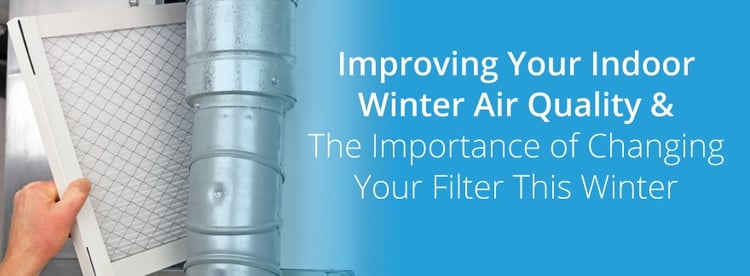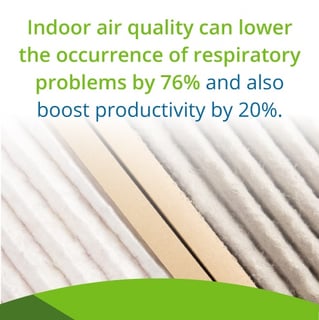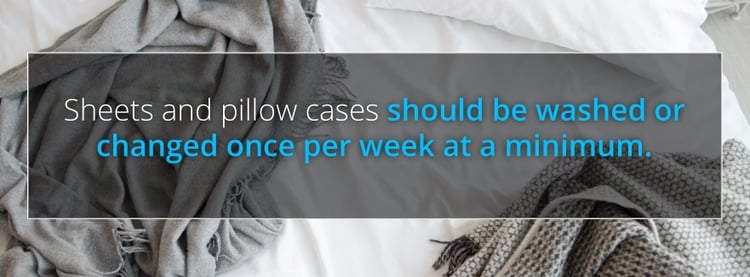
When it comes to indoor air conditions, people tend to concern themselves primarily with the quality of air during summer. However, indoor winter air quality is equally important.
Since people spend more of the winter months indoors, and since windows and doors are generally kept shut when the weather gets cold, indoor air is mostly recycled during these months. Consequently, germs that are either brought in from the outside or that take root in the home are re-circulated over and over again for many months unless the indoor air is purified during winter.
In order to maintain healthy winter air quality all season long, you need to have the proper air filtration arsenal set up within your home. You also need to know when to change your air filter during winter to ensure the equipment performs properly.

A quality winter air filter is also important in commercial buildings, nearly a third of which (30%) have poor indoor air quality. Consequently, American businesses see a 33% slope in productivity as wintertime allergies take hold. The financial impact of this yearly drop runs in the ballpark of $160 billion. For obvious reasons, cleaning and changing your air filter is necessary for your indoor air quality during winter.
Change Your Furnace Air Filter
In the winter months, an air filter keeps the indoor air fresh. When outdoor temperatures drop below 50 degrees, this allows you to keep the air from getting stuffy without having to crack a window. After all, the last thing you'd want to do is allow all the warmth generated by the heater or fireplace to escape the house. With heaters, especially, a cracked window could add to your energy expenses.
However, in order for an air filter to keep the indoor air clean, the filter itself needs to be free of dirt deposits. Therefore, the filter should be checked once per month for deposits of dirt and dust. Clean the filter when necessary to allow for clean air filtration.
If you are in the process of buying a new air filter, choose a HEPA model, since these are more effective at removing germs from the air.
Purchase a Whole-Home Humidifier
A lot of people make do with a single air humidifying unit, but this can be ineffective if you live in anything larger than a one- or two-room apartment. For better results, set up a humidifying system that can penetrate each room and hallway throughout your house. This way, air will be more pure wherever you walk, no matter how long the cold temperatures persist outside.
A whole-home humidifier works through each of the air ducts in an HVAC system. As the humidifiers take effect in each room, the effects of winter dryness — static shocks, dry skin and nasal passages — are combated throughout the house. If members of your household are particularly susceptible to sore throat symptoms during wintertime, a whole-home humidifier can make the colder months a lot more comfortable.
Add an Air Purifier
In some households, the indoor air needs more than filtration and humidification to be sanitary during wintertime. If members of your household are highly vulnerable to pet dander, pollens and other airborne germs, consider purchasing an air purifier for your home. Much like a humidifier, an air purifier works through the ducts of your HVAC system and purifies the air that re-circulates indoors throughout the winter.
If you cook a lot and have guests over during the winter months, an air purifier can help ensure the good health of everyone who visits. After all, the last thing you want is to have an allergy upset a Halloween, Thanksgiving, Christmas or New Year's event you’re hosting. With an air purifier, your indoor air is kept free of germs and deliciously clean.
Get Plants for Your House
It's long been known that while humans and other species inhale oxygen and exhale carbon dioxide, plants absorb the latter and distribute the former. Therefore, flora and fauna create a healthy air balance between one another. As such, houseplants can aid in the freshness and purity of indoor air.
In a 1989 study conducted by NASA, the following houseplants were found to offer unique benefits to indoor air quality:
- English Ivy: Absorbs formaldehyde — a gas found in particleboard and plywood — from the air and is especially beneficial in homes that are prone to mold formation.
- Peace Lily: Absorbs the airborne particulates of the VOC benzene carcinogen emitted from certain paints.
- Lady Palm: Especially beneficial for household members with respiratory problems thanks to the plant's ability to absorb ammonia from the air.
One more for you to consider: Of all the plants that serve the age-old purpose of absorbing carbon dioxide and generating oxygen, one of the most effective for households is the snake plant.
Check the Rating of a Commercial Air Filter
 Before you purchase an air filter, it's important to check the measurements of its minimum efficiency reporting value (MERV). MERV is determined by its size range, as indicated by the following measurements according to the ASHRAE 52.2 Test Standard:
Before you purchase an air filter, it's important to check the measurements of its minimum efficiency reporting value (MERV). MERV is determined by its size range, as indicated by the following measurements according to the ASHRAE 52.2 Test Standard:
- E1: Indicates very fine particles in the range of 0.3 to 1.0 micrometers
- E2: Indicates fine particles in the range of 1.0 to 3.0 micrometers
- E3: Indicates coarse particles in the range of 3.0 to 10.0 micrometers
It's crucial to inspect the ASHRAE 52.2 Test Standard — especially if members of your household have respiratory problems. The particles that are likeliest to deeply penetrate the lungs are also the tiniest — below 2.5 microns — and the most toxic.
Choose Filters With Mechano–Electret Media
 Filters that offer a combination of electret and mechanical efficiency are preferable to those limited to the latter quality. This is due to the heightened capturing efficiency of electret media. Even though the size of submicron particles is tinier than the spaces in said media, mechano-electret filters are more powerful at eliminating particles from the air that could cause allergies or respiratory problems.
Filters that offer a combination of electret and mechanical efficiency are preferable to those limited to the latter quality. This is due to the heightened capturing efficiency of electret media. Even though the size of submicron particles is tinier than the spaces in said media, mechano-electret filters are more powerful at eliminating particles from the air that could cause allergies or respiratory problems.
Mechano-electret filters can also be of great use in office buildings and commercial interiors. According to experts from Kimberly-Clark, indoor air quality can lower the occurrence of respiratory problems by 76% and also boost productivity by 20%. With mechano-electret filters, businesses can reap huge benefits and become a lot more efficient thanks to the improved quality of your indoor air all year long.
Dust Your Furnishings Regularly
As an aside to clean air filtration, it's important to make sure the tiny particles from your furnishings don't get swept into the air and contaminate the air you breath. Therefore, you should consider making wiping and vacuuming your furnishings on a regular basis a priority.
Run a damp cloth over your tables, shelves, wooden chairs, window panes, picture frames, televisions, appliances and lamp shades every four to six weeks to prevent dust from accumulating and infecting the air.
If you have a great deal of computer or stereo components, arrange them in dust-proof shelving. For example, a computer table with shelves and cabinets is good for items like external hard drives, surge protectors, scanners and other peripheral components that could otherwise be time-consuming to dust.
When you have most of the components placed in closed cabinets with cord holes, you don't have to risk damaging anything just to keep your computer arsenal clean.
Vacuum and Steam-Clean Your Carpets Regularly
Dirt and dust can also accumulate in rugs and carpets, which should be vacuumed on a regular basis — preferably once per week, minimum — all year long. Each time you vacuum, everything from dirt walked in from the outside to pet dander unleashed by cats and dogs gets eliminated from the air in your home.
It's best to vacuum after you've dusted your furnishings, because this will capture stray dust that your damp cloth fails to collect. If the time has come to purchase a new vacuum, choose a model with a HEPA filter, which can capture allergens more effectively than standard vacuums.
On at least a monthly basis, your carpets should also be steam-cleaned. When you follow a vacuuming with a steam-cleaning treatment, the deeper-saturated germs within your carpeting, such as tiny organisms and dust mites, are removed. This allows for cleaner and more purified air throughout your house.
Change Your Bedding
One furnishing that can quickly collect germs is the bed, which is where you spend up to a third of your time overall. As you lie in bed, the particles that land in your hair throughout the day are rubbed off onto your pillow cases, while airborne particles that stick to your skin get passed onto the sheets.
Furthermore, mites and airborne germs from the bedroom gradually land inside the linens. For anyone who's allergy-prone or especially sensitive to germs, infrequent bedding change-outs can actually be dangerous.

Sheets and pillow cases should be washed or changed once per week at a minimum. To make your bedding more germ-proof, get hypoallergenic covers for your pillows, comforter and mattress. The mattress, especially, needs this protection. Unlike the rest of your bedding, you can't wash it in a machine. A cover for your mattress will make it difficult, if not impossible, for mites to nest there. This in turn will make your bed safer over the long run.
Clean Your Bathroom Regularly
One of the most germ-laden areas of the home is the bathroom, which not only collects human germs, but can also breed molds via moisture. For obvious reasons, you should disinfect the toilet seat and bowl several times per week and the bathroom floor should be mopped at least once per week.
However, you might be overlooking additional spots that can also serve as breeding grounds for germs, such as the toothbrush container and cabinets, which you should clean at least once per month.
Other things to pay attention to in the bathroom are the shower curtain and floor mat. The shower curtain should be washed once per month and replaced every two years or so to prevent the buildup of mold from shower water. The floor mat should also be washed on a regular basis — preferably each time you mop the bathroom floor.
If your bathroom has wallpaper, consider replacing it with a paint job. Mold can form behind wallpaper in moisture-prone environments.
Don't Use Chemical Cleaners
The use of chemical cleaners should be reduced at all costs. Even though cleaners of this sort are known to clear germs and stains away within seconds, chemical products can also leave unhealthy toxins in the air that are often hard to clear from your home — especially during months when it's best to keep your windows sealed.
Therefore, the healthier option is to go with organic and natural cleaners when you clean and disinfect the floors and fixtures in your kitchen and bathroom.
Granted, natural products such as vinegar and baking soda are not always capable of removing some of the more stubborn stains, but it's best to use these products instead of bleach, alcohol and ammonia as much as possible.
Additionally, a steam-cleaner is a more powerful option than any chemical product for kitchen and bathroom floor cleaning. These machines use heat to eliminate deeply-ingrained contaminants.
Clean Your Kitchen Daily
Just as with the bathroom, it's important to keep your kitchen clean and well-ventilated throughout the year. After all, a majority of germs that circulate within a kitchen originate there, be it from water, mold or spoiled food remnants. When food goes bad, the odor may cause air contamination that can lead to winter-long air problems as the germs are recirculated throughout the house.
Kitchen countertops should be cleaned once or twice per day — preferably once all the dishes have been cleaned and returned to their cabinets. The floor should be mopped or steam-cleaned once per week and the refrigerator and range should be given fortnightly cleanings — if not more often — to combat dirt and gunk buildup.
Some of the more overlooked areas, such as the refrigerator under-tray, should be cleaned twice annually to prevent the development of mold spores. Also, be sure to wipe stray water from behind the faucet during every use of the kitchen sink, as this can lead to mold buildup along the wall if not handled properly.
Learn More From Smart Touch Energy
Winter air quality is just as important as the state of your indoor air during the summer months. Therefore, it's important to clean your winter air filter on a regular basis, in addition to performing periodic HVAC maintenance.
Getting ready for colder weather and need to top off your oil tank? Smart Touch Energy serves residents in the New England and the tri-state area. Check local pricing and delivery for your next heating oil fill with Smart Touch Energy.


